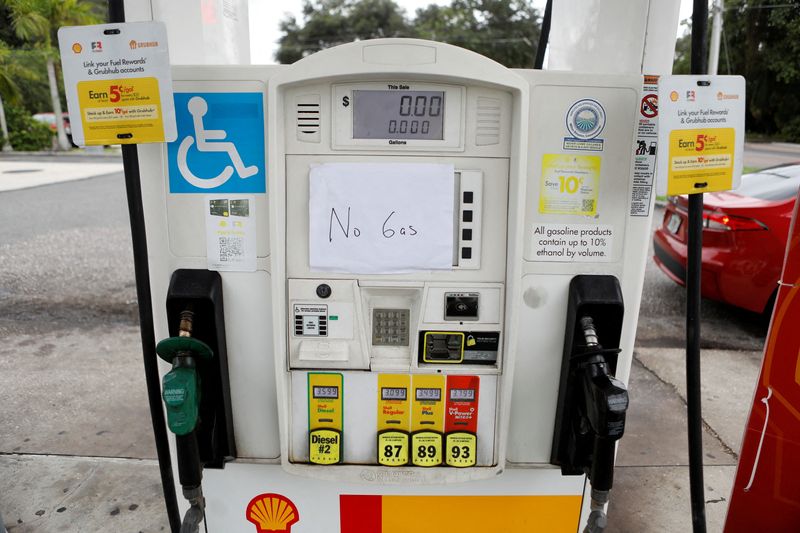By Shariq Khan
NEW YORK (Reuters) -Nearly a quarter of Florida's gasoline stations were out of fuel on Wednesday afternoon as residents rushed to evacuate ahead of Hurricane Milton, which some fear could become one of the most destructive storms ever to hit the state's Gulf Coast.
More than a million people in coastal areas were under evacuation orders, clogging highways and causing fuel shortages from Tampa to Orlando in a region still reeling from the devastation of Hurricane Helene less than two weeks ago. Milton is expected to slam ashore in the Tampa Bay metropolitan area late on Wednesday.
About 24% of nearly 8,000 gasoline pumps in Florida were out of fuel as of 12 p.m. EDT on Wednesday, up from over 17% the previous evening, according to market tracker GasBuddy. Outages were most severe in the Tampa-St. Petersburg area with more than half of the regional stations out of gasoline.
Other regions in the predicted path of the storm also reported high outages. Over 35% of stations in Fort Myers-Naples area were out of fuel, and about 27% of stations in the Orlando-Daytona Beach area were empty, GasBuddy data showed.
U.S. gasoline demand jumped by 1.1 million barrels per day in the week ended Oct. 4, the biggest weekly increase since 2001, according to government data. The data does not breakdown state-level demand, but analysts said stockpiling by retailers in Florida was partly behind the surge. [EIA/S]
Florida is the third-largest gasoline consumer in the United States. There are no refineries in the state, so it depends on fuel shipments from elsewhere by land or water.
RESUPPLY CHALLENGE
Milton's severity and predicted path over Tampa Bay, where the bulk of Florida's fuel import and storage terminals are located, make it potentially the most devastating hit to the state's fuel markets since 1992's Hurricane Andrew, OPIS oil analyst Tom Kloza said on Tuesday.
More than 43% of Florida's fuel imports move through Port Tampa Bay, according to the port's website.
The Port of Tampa Bay was shut for all vessel traffic starting on Tuesday, and a prolonged closure would disrupt fuel supply into western and central Florida, said Ben Ruddell, director of the FEWSION Project, which monitors domestic supply chains.
Waterborne vessel movement of energy products within the Gulf of Mexico will likely be delayed by several days, said Jon Davis, chief meteorologist at Everstream Analytics. That means truck delivery will be the only way to replenish fuel storage tanks in the immediate aftermath of the hurricane.
Wholesale fuel distributor Mansfield has suspended fuel deliveries in Tampa, Orlando and many other markets in Florida, it told clients on Wednesday.
Mansfield has positioned trucks in nearby markets, although winds need to slow down to under 35 miles per hour before they can start making deliveries again. Milton was packing winds of 125 miles an hour as of the National Hurricane Center's latest update.
Damage to fuel terminals around the port would also impede resupply efforts.

Kinder Morgan Inc (NYSE:KMI), Chevron Corp (NYSE:CVX), CITGO Petroleum and Buckeye Partners were among energy companies shutting down Tampa terminals to protect against damages.
Kinder Morgan also shut its Central Florida Pipeline system, two small pipelines that haul gasoline, ethanol, diesel and jet fuel from Tampa to Orlando.